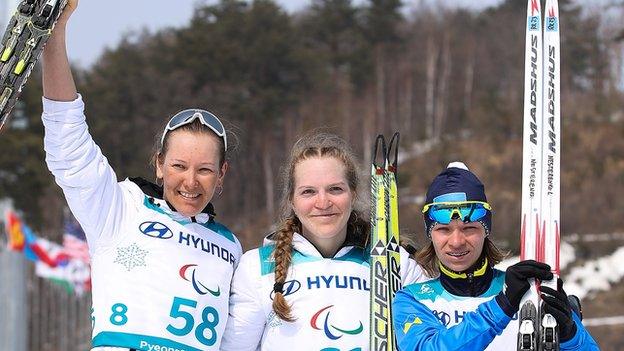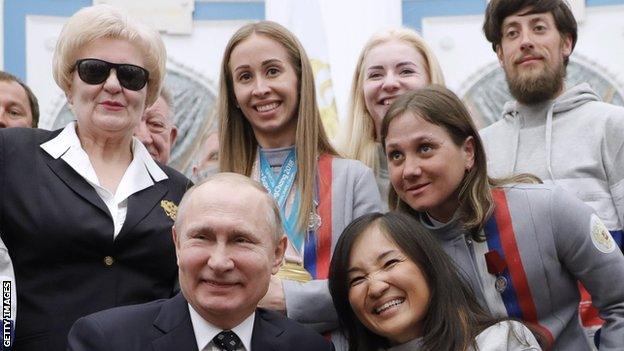Winter Paralympics 2022: Russia decision to be made by IPC on Wednesday
- Published

Russian skiers Anna Milenina and Ekaterina Rumyantseva - posing here with Ukrainian bronze medallist Liudmyla Liashenko - won five of eight gold medals for the nation's athletes at Pyeongchang 2018
A decision about banning Russian athletes from the 2022 Winter Paralympics will be made on Wednesday after it was confirmed the full Ukraine squad will take part in Beijing.
All Russian athletes have arrived before the Games start later this week.
The opening ceremony is on Friday, with competition starting on Saturday.
"Any decision we take is open to legal challenge from different sides," said International Paralympic Committee president Andrew Parsons.
"This is what we need to be very careful about because it could be from Russia or from other nations.
Andrew Parsons, IPC president: Any decision on Russia open to legal challenge
"We need to make a decision based on our constitution and the values we stand for."
Russian athletes will compete under the Russian Paralympic Committee flag at the Winter Paralympics following a ban imposed in 2020 for state-sponsored doping.
At Pyeongchang in 2018, they competed under a neutral flag for the same reason.
Parsons said the IPC understood some athletes from other nations might choose not to participate if the Russians are allowed to take part.
Ukrainian athletes - as well as the British Olympic Association- have called for Russians to be excluded from the event.
In a wide-ranging interview with BBC sport editor Dan Roan, Parsons also said:
The events in Ukraine were "horrifying and should not be happening in the 21st Century".
The Sochi 2014 Paralympics did not legitimise Russian President Vladimir Putin's regime.
Friday's opening ceremony will be used to promote "a message of peace".
Athletes are allowed to protest if "it comes from a positive angle", although "rules are in place" for the podium and ceremonies.
The full Ukraine team, which consists of 20 athletes and nine guides across biathlon and cross-country skiing, will be able to compete in the Chinese capital.
There had been concerns the athletes would not be able to travel safely.
But the Ukrainian Disabled Sports Committee has announced the athletes will arrive on Wednesday.
"Part of the team is in one place, part is in another. I hope that today we will unite and get to the airport and go to Beijing together," said Natalia Garach, a spokesperson for the committee.
"The team is not in Ukraine. We will not tell where we are."
Why can't the IPC issue an immediate ban to Russian athletes?

Russian President Vladimir Putin met the nation's Paralympic athletes following the 2018 Pyeongchang Games
Sporting organisations are continuing to impose sanctions on Russian teams and athletes after the country, supported by Belarus, launched a military invasion of Ukraine last Thursday.
On Monday, Russian football clubs and national teams were suspended from all competitions by Fifa and Uefa "until further notice".
It means the Russian men's team will not play their World Cup play-off matches next month and the women's team have been banned from this summer's Euro 2022 competition.
The International Olympic Committee has urged sport governing bodies to ban Russian and Belarusian athletes.
Parsons says the IPC has different rules and regulations from many other organisations, while also pointing to the short timeframe before the competition begins.
"Everyone is entitled to have opinions but when it comes to make decisions on the Paralympic Games, it is up to the IPC board," said Parsons, a Brazilian who was elected for a second term in December.
"We need to follow our constitution, we need to follow the values that we stand for as a movement and as an organisation.
"The options that we have in front of us will be, I think, limited by legal framework. That's because we have to deal with the consequences of the decisions were made.
"Some other organisations making decisions have competitions in six months' time, in one year's time or in two years.
"We have a competition starting in three days. We need to make a decision that if it's challenged, we are able to defend it and maintain it."